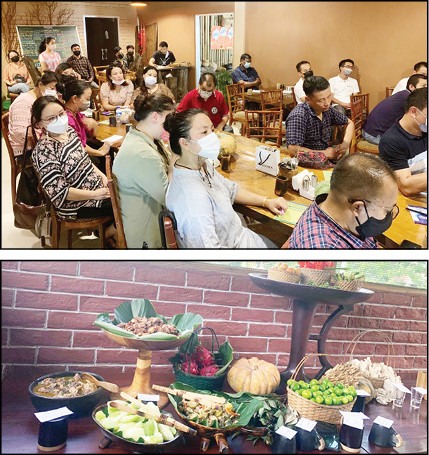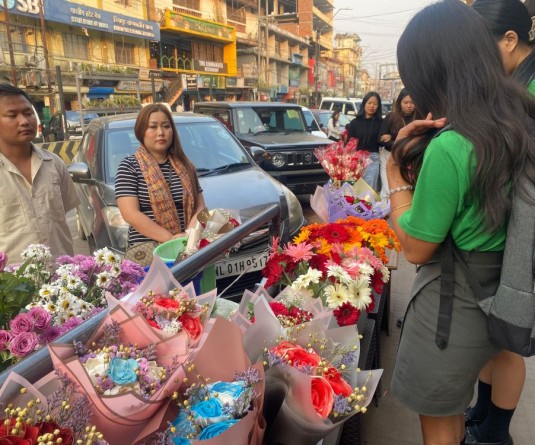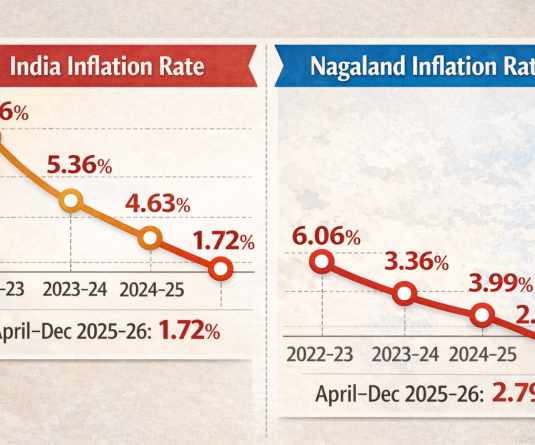(Top) Participants during the capacity building programme organised by the JCC. (Bottom) A section of the indigenous Naga food display. (Morung Photos)

Morung Express News
Kohima | October 17
The continuity of Naga traditional cuisines and its sustainability were highlighted during a capacity building programme on agro biodiversity, food security and climate change organised by Japfü Christian College on October 15 and 16.
Held at The King Chilli and The Naga Bowl, Dimapur, the programmes were organised in collaboration with Nagaland Institute of Development Studies, Dimapur, The King Chilli, Naga Bowl Express and UGC Scheme for Trans-disciplinary Research for India's Development Economy Scheme (STRIDE), JCC.
Giving an overview of food security and sustainability of Naga traditional cuisines, Principal of Japfü Christian College and Principal Investigator, STRIDE JCC, Dr Visakhonü Hibo opined that society, in the long run, would not advance to a pace of self-sufficiency if we do not learn to grow our own food. She therefore pointed out the need to promote and realize the importance of urban kitchen gardens or home grown food through understanding traditional food habits. She also underscored the need to continue age old food crops and food processes and incorporate traditional knowledge of the environment.
Dr Kanato Chophy, author, researcher and director presenting on "Insects on the Plate: Entomophagy, Sustainability and Entrepreneurship" described entomophagy, the practice of eating edible insects, as a complex form of indigenous knowledge system. It is an intimate knowledge of the environment, which forms part of sustainability and food security, Dr Chophy stated.
Dwelling on the pros of entomophagy which is also practiced by the Nagas, Dr Chophy underlined how experts have mentioned that the future of food security and sustainability would lie in eating edible insects as an alternative source of protein. The nutrients are as good as other animal meats and it is also environment friendly as there is less emission of green house gases. At the same time, it can be a good source of food tourism for Nagaland which has untapped potential for entrepreneurship and markets, he added.
During the two day master classes conducted by Colo Mero and Alemjungla Jamir, proprietors of The King Chilli and The Naga Bowl respectively, the experts dwelled on Naga traditional cuisine, techniques of recipe writing, plating and sample course luncheon. The master classes saw the showcasing of food items where experts in the same line shared on the importance of maintaining authenticity of Naga cuisines and ancestral practices.
While presentation and aesthetics of traditional food were viewed as part and parcel of food entrepreneurship, being able to give names, with clear and specific definition of ingredients was observed to be important keeping in mind the diversity and variety of preparation of food items.
Given the fact that Naga food has a huge untapped market, they said Naga food can become a niche market. It can also be used to promote the culture of Naga society given the correlation between food habits and culture in general.
While most of the ingredients of Naga cuisines like wild herbs and spices and other food are seasonal, the experts shared how it is important to find a way for sustaining its use throughout the year. Entrepreneurs can explore this aspect and find solutions to meet such demands, they added.
Acknowledging that change in climate has also impacted certain foods, Mero and Jamir also pointed out that advice from experts are an important component of food security that complement traditional knowledge system of farmers.





